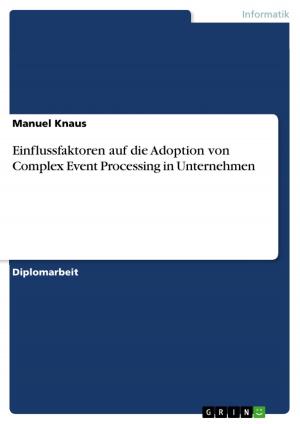Analysis of the Internationalisation Strategies of German Car Companies in China
Analyse der Internationalisierungsstrategien deutscher Automobilhersteller in der Volksrepublik China
Business & Finance, Management & Leadership, Management| Author: | Patrick Schrott | ISBN: | 9783656335993 |
| Publisher: | GRIN Verlag | Publication: | December 18, 2012 |
| Imprint: | GRIN Verlag | Language: | English |
| Author: | Patrick Schrott |
| ISBN: | 9783656335993 |
| Publisher: | GRIN Verlag |
| Publication: | December 18, 2012 |
| Imprint: | GRIN Verlag |
| Language: | English |
Bachelor Thesis from the year 2012 in the subject Business economics - Business Management, Corporate Governance, grade: 1,3, , course: Automotive Management, language: English, abstract: China's economy is growing year by year. The persistent growth has affected the auto-mobile sector in particular. Increasing income and the passenger vehicle as an exclusive status-symbol has risen the private demand. In 2009, the PRC overtook the USA as the biggest automotive market in the world in production as well as in sales. This trend will certainly continue: With economic problems like stagnating real income, rising raw material prices and credit-driven consumerism in the industrial countries the importance of the Chinese market for car companies will even grow. Saturated passenger car markets in the USA and Western Europe and low rates of motorisation in new auto-motive markets like China focus the attention of the market participants on these new, growing markets. But the upward trend has already shown a downside. Increasing de-pendency on the strong politically influenced market and claims about know-how transfer are exemplary threats. As German enterprises in this industrial sector are popular worldwide and the car-industry is the key industry in our country, the internationalisation strategies of German automotive companies in China will be analysed in the following. The trend of the Chinese automobi-le market can be summarised in a quote of Dieter Zetsche, CEO of Daimler: 'Wir fahren noch nicht im höchsten Gang, wir können noch mehr'. The quote relates to the expected turnover and profit records of Daimler in 2011, which were mainly based on the success in the PRC: The Swabian vehicle manufacturer sold 198,500 automobiles in China. In spite of these difficulties, the automotive market in the PRC is very attractive, especially for the well-known German firms. However, the companies should know how to manage the problems in China. Therefore, the choice of a suitable strategy of internationalisation is crucial. By definition internationalisation strategy is the orientation of corporate development by growth in different foreign markets. In contrast to an international market entry strategy, an internationalisation strategy is not only about starting business in a foreign market, but also developing a strategy in a market which has already been entered. The focus of this bachelor thesis is put on the passenger vehicle market and lines out why the Chinese market is profitable and attractive for German and international manu-facturers in general. [...]
Bachelor Thesis from the year 2012 in the subject Business economics - Business Management, Corporate Governance, grade: 1,3, , course: Automotive Management, language: English, abstract: China's economy is growing year by year. The persistent growth has affected the auto-mobile sector in particular. Increasing income and the passenger vehicle as an exclusive status-symbol has risen the private demand. In 2009, the PRC overtook the USA as the biggest automotive market in the world in production as well as in sales. This trend will certainly continue: With economic problems like stagnating real income, rising raw material prices and credit-driven consumerism in the industrial countries the importance of the Chinese market for car companies will even grow. Saturated passenger car markets in the USA and Western Europe and low rates of motorisation in new auto-motive markets like China focus the attention of the market participants on these new, growing markets. But the upward trend has already shown a downside. Increasing de-pendency on the strong politically influenced market and claims about know-how transfer are exemplary threats. As German enterprises in this industrial sector are popular worldwide and the car-industry is the key industry in our country, the internationalisation strategies of German automotive companies in China will be analysed in the following. The trend of the Chinese automobi-le market can be summarised in a quote of Dieter Zetsche, CEO of Daimler: 'Wir fahren noch nicht im höchsten Gang, wir können noch mehr'. The quote relates to the expected turnover and profit records of Daimler in 2011, which were mainly based on the success in the PRC: The Swabian vehicle manufacturer sold 198,500 automobiles in China. In spite of these difficulties, the automotive market in the PRC is very attractive, especially for the well-known German firms. However, the companies should know how to manage the problems in China. Therefore, the choice of a suitable strategy of internationalisation is crucial. By definition internationalisation strategy is the orientation of corporate development by growth in different foreign markets. In contrast to an international market entry strategy, an internationalisation strategy is not only about starting business in a foreign market, but also developing a strategy in a market which has already been entered. The focus of this bachelor thesis is put on the passenger vehicle market and lines out why the Chinese market is profitable and attractive for German and international manu-facturers in general. [...]















